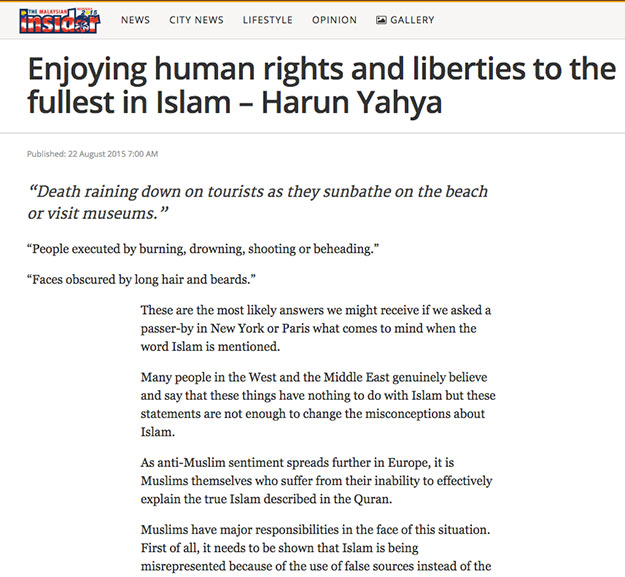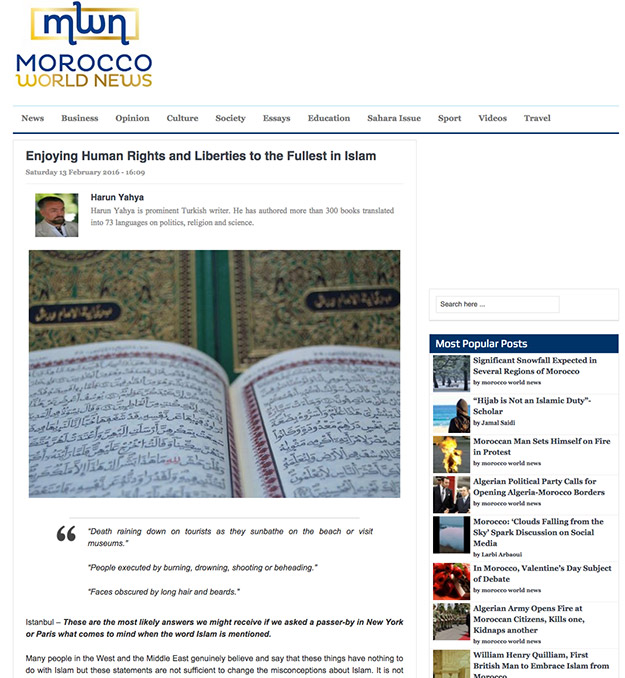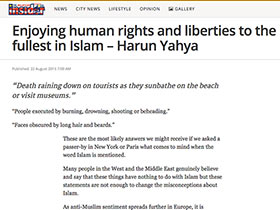
“Death raining down on tourists as they sunbathe on the beach or visit museums.”
“People executed by burning, drowning, shooting or beheading.”
“Faces obscured by long hair and beards.”
These are the most likely answers we might receive if we asked a passer-by in New York or Paris what comes to mind when the word Islam is mentioned.
Many people in the West and the Middle East genuinely believe and say that these things have nothing to do with Islam but these statements are not enough to change the misconceptions about Islam.
As anti-Muslim sentiment spreads further in Europe, it is Muslims themselves who suffer from their inability to effectively explain the true Islam described in the Quran.
Muslims have major responsibilities in the face of this situation. First of all, it needs to be shown that Islam is being misrepresented because of the use of false sources instead of the Quran, rather than making feeble objections and defences.
People need to be told, with supporting evidence, that all the qualities required in modern democracies and state systems are also inherent in Islam.
The main criticism of Muslims today is that these rights and freedoms regarded as the essence of democracy are absent from Islam. In the eyes of many Western thinkers and politicians, it is therefore impossible to reconcile Islam and democracy.
Yet the Quran, the Muslim sacred scripture with which mankind became acquainted 14 centuries ago, contains all and more of the free lifestyle embodied in the European Convention on Human Rights.
The Charter of Medina, enacted by Prophet Muhammad and regarded as the first ever constitution, is the most democratic constitution there has ever been.
The most fundamental element of human rights is the “right to life”. Article 2 of the Convention on Human Rights (ECHR) says that efforts must be made to protect the lives of all, apart from in the most exceptional circumstances.
Verses 28-30 of Surah 5 of the Quran also say that deliberate killing is a major sin, while verse 32 equates the killing of one person with the killing of all mankind.
In the view of the Quran, killing is only permissible when done for self-defence. While killing as an action lawfully undertaken for the purpose of quelling a riot or insurrection is regarded as an exceptional circumstance in ECHR, verses of the Quran about killing point to only cases of self-defence in times of war.
War, according to the Quran, is an “undesirable necessity” to be resorted to only for the purpose of self-defence when one has been attacked and that must be waged within specific human and moral bounds.
In other words, Muslims must choose the path of peace and reconciliation when attacked, but have to defend themselves if the other side rejects peace and insists on war.
Let me remind readers that there is nothing in the Quran about killing people because they hold other beliefs or fail to abide by the commandments of Islam. On the contrary, the Quran says that there can be no compulsion in the faith and describes a superior model of democracy that incorporates all believers and unbelievers.
Article 4 of ECHR prohibits slavery and forced labour. Slavery was a widespread social institution on the Arabian peninsula in the pre-Islamic period. It is estimated that almost half the population of the peninsula lived as slaves at that time.
Slaves owned by the wealthy were forced to work under inhuman conditions and treated as lower than animals.
The Prophet and his companions were strongly opposed to slavery. The reason for that attitude lies in the verses of the Quran. These verses say that slaves should not be maltreated, that their conditions should be improved and that they should even be freed (2:177, 2:221, 4:92, 5:89, 24:32, 26:22, 58:3-4, 90:12-13).
Numerous verses in the Quran encourage an environment in which people can live in peace and security. For example, verse 6 of Surah at-Tawbah commands Muslims to ensure the safety of people who are not Muslim, as well as people who are morally criticised in the Quran, even at the risk of their own lives. This is completely compatible with the right to liberty and security of person enshrined in Article 5 of ECHR.
The Quran demands the utmost scrupulousness over the provisions of justice, and Muslims are commanded to be just, even if that works against themselves or their own parents’ interests (4:135).
Other verses emphasise justice and correspond to the right to a fair trial enshrined in Article 6 of ECHR (84:158, 5:42, 7:29, 10:47, 49:9).
Article 9 of ECHR says that everyone has the right to freedom of thought, conscience and religion.
Islam is a religion that bestows freedom of thought and expression and that guarantees all their rights. Several verses of the Quran explicitly set this out.
Verse 256 of Surah al-Baqarah explicitly says there can be no compulsion in the faith. In other verses, God reminds people that the prophet of Islam is not an oppressor, only a reminder (88:21-22).
According to Quran-based Islamic morality, every Muslim must be open to the free expression of all ideas and beliefs found in society and must respect the lives, ideas and lifestyles of others. Such a Muslim will want ideas and ideologies that are incompatible with, or even opposed to religious moral values, to be freely expressed so that he can respond to them on an intellectual and ideological basis.
The banning of ideas and ideologies does not make life easier for Muslims. On the contrary, it makes preaching and the intellectual struggle more difficult.
The reason for the images in the international media that have lead Islam to being equated with terrorism and hostility to art and science is the adoption of radical interpretations and various accounts of dubious veracity as the source of Islam, rather than the Quran.
What needs to be done in the face of such error is to explain that liberty, understanding, the right to life, art and science are all inseparable components of Islam.
Islam means beauty, comfort, peace, love, freedom and democracy. Islam bestows a wide range of rights and liberties on people.
Adnan Oktar's piece on Malaysian Insider & Morocco World News:



